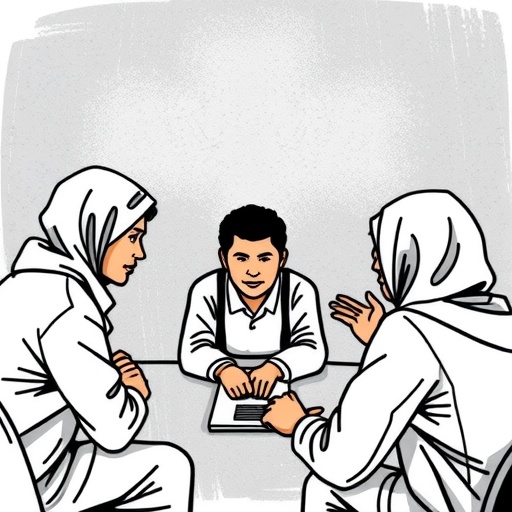In recent years, the mental health and wellness of clergy members have come under scrutiny, revealing significant insight into their coping mechanisms and emotional resilience. A pioneering study led by researcher P. Cimafranca III focuses on the coping strategies employed by pastors within the Christian and Missionary Alliance Churches of the Philippines. This groundbreaking research unfolds beneath the lens of phenomenology, aiming not only to gather quantitative data but to unearth the qualitative experiences that shape the lives of these spiritual leaders. The findings from this study promise to shift the paradigms of pastoral care and self-care, highlighting the complex interplay between vocation, emotion, and mental health.
Pastors play an integral role in their communities, providing spiritual guidance, counseling, and support. Yet, this vital role often comes with immense stress and emotional burden. Understanding how these leaders cope with their challenges is essential not only for their personal well-being but also for the health of the communities they serve. The study by Cimafranca seeks to address this pressing issue, exploring the unique strategies that pastors in the Philippines employ to navigate their multifaceted roles.
The research utilized a phenomenological approach, which shines a light on the lived experiences of individuals, allowing for a deeper understanding of their thoughts and emotional states. Through interviews and personal narratives, Cimafranca sought to uncover the myriad ways pastors develop resilience and manage stress. Each pastor’s story offered insights into their personal battles, triumphs, and unique coping methods, framing these experiences within their cultural and religious contexts.
Central to the study were the coping strategies identified by these pastors. From prayer and meditation to active community engagement, each pastor narrated their personal toolkit for dealing with stress. For some, religious practices served as a cornerstone, offering solace and strength in times of adversity. Others turned to community support, relying on peers within their respective congregations to share burdens and foster resilience through communal faith. This diverse range of strategies highlights the individualized nature of coping, stressing that there is no one-size-fits-all answer to managing the pressures of pastoral life.
Another significant aspect of the research was the role of self-care. Many pastors expressed the importance of maintaining a balanced life, emphasizing that neglecting their own spiritual and emotional needs could lead to burnout and diminished effectiveness in their ministry. This balancing act between personal well-being and professional responsibilities forms a critical theme; pastors are often so committed to their congregations that they may overlook their own health and happiness.
Among the emergent themes was also the impact of societal expectations on pastoral mental health. Many pastors felt the pressure to maintain a flawless facade, often struggling to openly discuss their vulnerabilities and stressors with their congregations. The stigma surrounding mental health can exacerbate isolation, leading some pastors to internalize their challenges rather than seeking help. Cimafranca’s study illuminates the need for supportive environments where transparency and mental health discussions are welcomed rather than shunned.
Moreover, the cultural context plays a pivotal role in shaping these coping strategies. In the collectivist settings of the Philippines, communal ties often dictate how individuals approach their struggles. Factors such as familial obligations, social rituals, and community outreach initiatives all influence the methodologies pastors utilize. By integrating these cultural nuances into the study, Cimafranca addresses the importance of contextualization in understanding coping mechanisms.
The research findings not only contribute to the academic field of pastoral psychology but also have practical implications for church leadership and management. By creating awareness around the mental health of pastors, church boards can design support systems that prioritize the emotional needs of their leaders. This may involve workshops, counseling services, or peer support groups aimed specifically at fostering mental wellness among clergy.
Furthermore, the implications of this study extend beyond the individual pastor to the broader church community. As clergy members engage in self-care and adopt effective coping strategies, their enhanced mental health can lead to more vibrant, supportive, and effective congregations. The health of the pastor directly correlates with the health of the church, indicating that investments in clergy mental wellness can yield significant returns in the form of community cohesion and spiritual growth.
Cimafranca’s insights serve as a clarion call for future research and dialogue surrounding the mental health of clergy. As the pressures of modern society continue to mount, it becomes increasingly crucial to focus on the well-being of those who guide us spiritually. This study provides a compelling framework for understanding how pastors can cultivate resilience while inviting church communities to actively participate in supporting their leaders.
In summary, the exploration of coping strategies among pastors of the Christian and Missionary Alliance Churches in the Philippines yields invaluable insights for clergy mental health and resilience. By understanding the unique challenges faced by these spiritual leaders and their adaptive mechanisms, we can foster discussions that prioritize wellness, transparency, and support within these sacred vocations. Cimafranca III’s research serves as a vital contribution to the ongoing discourse surrounding mental health in religious contexts, reminding us that the journey towards emotional wellness is as much a communal endeavor as it is a personal one.
Subject of Research: Coping strategies of pastors in the Christian and Missionary Alliance Churches of the Philippines.
Article Title: Coping Strategies of Pastors of the Christian and Missionary Alliance Churches of the Philippines: A Phenomenological Study.
Article References: Cimafranca III, P. Coping Strategies of Pastors of the Christian and Missionary Alliance Churches of the Philippines: A Phenomenological Study.
Pastoral Psychol (2025). https://doi.org/10.1007/s11089-025-01277-5
Image Credits: AI Generated
DOI:
Keywords: Pastoral psychology, mental health, coping strategies, Philippines, community support, phenomenological study, clergy, resilience.




